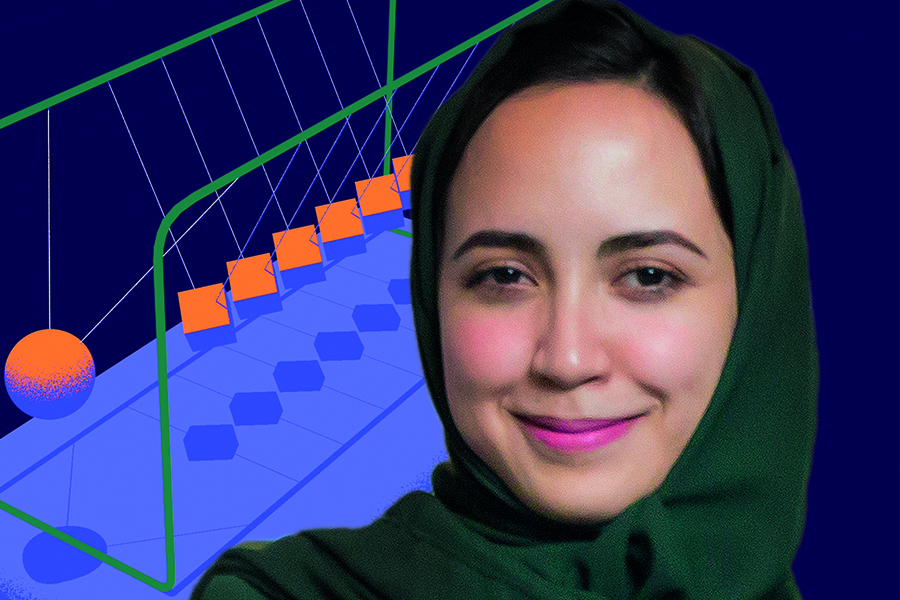
Afnan Sherbeeni is helping to transform the Saudi Arabian employment market. As co-founder of the flexible-staffing platform Sabbar, she is creating new opportunities for Saudis to gain experience, earn income, and pursue their dreams.
As the tech revolution sweeps across Saudi Arabia, the days of leaving resumes in shops, restaurants, and employment agencies have become ancient history for Saudi Millennials and Generation Z.
“The traditional way of working does not match the aspirations of the new generation,” says Afnan Sherbeeni, who co-founded Sabbar, the on-demand staffing platform that matches busy recruiters with an ever-growing community of independent gig workers, in early 2019. “Saudis today want flexibility. They want to own their time. The culture has shifted.”
The rise of Sabbar over the last three years reflects the changes that have taken place in Saudi Arabia since the launch of the Kingdom’s Vision 2030 transformation plan six years ago. With tourists arriving from around the world, new hotels and restaurant chains opening across the country, and multi-billion-dollar investments being made in retail, hospitality, and entertainment, the demand for flexible staffing is high.
At Sabbar, the number of shifts that the platform fulfills has been increasing by as much as 40% per month. Major employers, such as IKEA and Domino’s Pizza, rely on the start-up to help them find qualified workers fast. Sabbar takes care of costly and time-consuming processes, such as interviewing, vetting, and scheduling shifts, eliminating the many pain points of recruitment for companies of all sizes.
At the same time, Sabbar serves as a fast track to a new world of opportunities for people across a country in transformation—from young workers entering the employment market to homemakers who want to earn income from temporary jobs on their own terms.
“Sabbar is changing lives,” Sherbeeni says. “As techies, we are used to spending our time in front of a screen, but when you see the impact that Sabbar is having on ordinary people, it is incredibly fulfilling for us all.”

Why did you launch Sabbar?
For employers, the recruitment of frontline workers is a major challenge. Turnover is high. The cost of recruitment and operations is rising. Companies want more flexible cost structures. Meanwhile, employees view positions in retail and hospitality mainly as ways to generate extra income, as opposed to long-term careers. Then there is the growth of the digital economy in alignment with Vision 2030. With my co-founders, Mohamed T. Ibrahim and Abdulrahman Al-Mudaiheem, we saw all these trends converging and launched Sabbar.
What sort of people use Sabbar to find work?
We are creating new opportunities for all sorts of people. Almost half the people on our database are women. Many of our workers are students who want to gain experience, pay for university tuition, or support their parents. One of the top performers on our platform is a full-time temp worker, who may work at a cookie store in the morning and at a pharmacy in the evening. She is enjoying it, she owns her time, and she meets different people and gains incredibly diverse experience. What people are looking for above all is flexibility, experience, and extra income.
One of the aims of Vision 2030 is to support flexible work and cater to these shifts in the culture and the economy. We are accelerating this move to a new model for work.
How does Sabbar make money?
We are commission-based on an hourly basis. We are paid by our corporate partners. They pay fees in addition to paying our workers. In fact, we are developing initiatives to increase the average monthly income per worker.
““There has never been a better time to be a technology entrepreneur in Saudi Arabia”
Afnan Sherbeeni, Co-founder, Sabbar
How are you funded?
In 2019 we raised seed money from a group of angel investors, most of whom are experts within the industry. Last year, in our second round, we raised $4.5 million from multiple venture capitalists in the region, including STV, Venture Souq, Derayah, and Seedra.
How has the community grown around entrepreneurs in Saudi Arabia?
The technology entrepreneurship scene has been transformed in Saudi Arabia. I have received huge support from everyone around me, from the team and the co-founders to private and public entities. We have benefited from a lot of mentorship, connections and programs for start-ups. The level of enablement has been amazing.
What is next for Sabbar?
We are looking to raise more funds. We want to scale up our training offer for employers. We want to expand into new, high-growth sectors, such as logistics and manufacturing.
We are also aiming to provide financial services, such as micro loans for gig workers and small businesses. Geographically, we are planning to expand in the Middle East, North Africa, and Pakistan. This is an $11 billion market, and we are passionate about disrupting it![]()
Published as branded content in WIRED magazine









